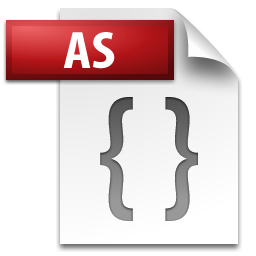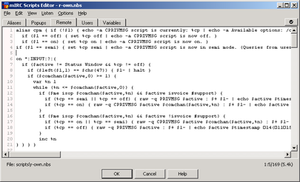Forth is a stack-oriented programming language and interactive integrated development environment designed by Charles H. "Chuck" Moore and first used by other programmers in 1970. Although not an acronym, the language's name in its early years was often spelled in all capital letters as FORTH. The FORTH-79 and FORTH-83 implementations, which were not written by Moore, became de facto standards, and an official technical standard of the language was published in 1994 as ANS Forth. A wide range of Forth derivatives existed before and after ANS Forth. The free and open-source software Gforth implementation is actively maintained, as are several commercially supported systems.

IRC is a text-based chat system for instant messaging. IRC is designed for group communication in discussion forums, called channels, but also allows one-on-one communication via private messages as well as chat and data transfer, including file sharing.
Rebol is a cross-platform data exchange language and a multi-paradigm dynamic programming language designed by Carl Sassenrath for network communications and distributed computing. It introduces the concept of dialecting: small, optimized, domain-specific languages for code and data, which is also the most notable property of the language according to its designer Carl Sassenrath:
Although it can be used for programming, writing functions, and performing processes, its greatest strength is the ability to easily create domain-specific languages or dialects

The C shell is a Unix shell created by Bill Joy while he was a graduate student at University of California, Berkeley in the late 1970s. It has been widely distributed, beginning with the 2BSD release of the Berkeley Software Distribution (BSD) which Joy first distributed in 1978. Other early contributors to the ideas or the code were Michael Ubell, Eric Allman, Mike O'Brien and Jim Kulp.

Visual IRC (ViRC) is an open-source Internet Relay Chat client for the Windows operating system. Unlike many other IRC clients, nearly all of the functionality in ViRC is driven by the included IRC script, with the result that the program's behavior can be extended or changed without altering the source code.
An environment variable is a user-definable value that can affect the way running processes will behave on a computer. Environment variables are part of the environment in which a process runs. For example, a running process can query the value of the TEMP environment variable to discover a suitable location to store temporary files, or the HOME or USERPROFILE variable to find the directory structure owned by the user running the process.

The F Virtual Window Manager (FVWM) is a virtual window manager for the X Window System. Originally a twm derivative, FVWM is now a window manager for Unix-like systems.

ActionScript is an object-oriented programming language originally developed by Macromedia Inc.. It is influenced by HyperTalk, the scripting language for HyperCard. It is now an implementation of ECMAScript, though it originally arose as a sibling, both being influenced by HyperTalk. ActionScript code is usually converted to bytecode format by a compiler.

IRC scripts are a way of shortening commands and responding automatically to certain events while connected to an IRC network. There are many different scripting languages for different types of IRC clients: ircII, BitchX, HexChat, mIRC, Visual IRC, Bersirc, and others have their own scripting languages, many of which share common features and syntax and therefore are easily portable from one IRC client to another.

Stata is a general-purpose statistical software package developed by StataCorp for data manipulation, visualization, statistics, and automated reporting. It is used by researchers in many fields, including biomedicine, economics, epidemiology, and sociology.

CMake is a free, cross-platform, software development tool for building applications via compiler-independent instructions. It also can automate testing, packaging and installation. It runs on a variety of platforms and supports many programming languages.
Action Message Format (AMF) is a binary format used to serialize object graphs such as ActionScript objects and XML, or send messages between an Adobe Flash client and a remote service, usually a Flash Media Server or third party alternatives. The Actionscript 3 language provides classes for encoding and decoding from the AMF format.
A batch file is a script file in DOS, OS/2 and Microsoft Windows. It consists of a series of commands to be executed by the command-line interpreter, stored in a plain text file. A batch file may contain any command the interpreter accepts interactively and use constructs that enable conditional branching and looping within the batch file, such as IF, FOR, and GOTO labels. The term "batch" is from batch processing, meaning "non-interactive execution", though a batch file might not process a batch of multiple data.

C# Open Source Managed Operating System (Cosmos) is a toolkit for building GUI and command-line based operating systems, written mostly in the programming language C# and small amounts of a high-level assembly language named X#. Cosmos is a backronym, in that the acronym was chosen before the meaning. It is open-source software released under a BSD license.

Mibbit was a web-based client for web browsers that supports Internet Relay Chat (IRC), Yahoo! Messenger, and Twitter. It is developed by Jimmy Moore and is designed around the Ajax model with a user interface written in JavaScript. It is the IRC application setup by default on Firefox. Following an announcement on the website homepage, Mibbit shut down on August 30th, 2024.

Rexx is a programming language that can be interpreted or compiled. It was developed at IBM by Mike Cowlishaw. It is a structured, high-level programming language designed for ease of learning and reading. Proprietary and open source Rexx interpreters exist for a wide range of computing platforms; compilers exist for IBM mainframe computers.
The following outline is provided as an overview of and topical guide to the Perl programming language:

Yesod is a web framework based on the programming language Haskell for productive development of type-safe, representational state transfer (REST) model based, high performance web applications, developed by Michael Snoyman, et al. It is free and open-source software released under an MIT License.
Tcl is a high-level, general-purpose, interpreted, dynamic programming language. It was designed with the goal of being very simple but powerful. Tcl casts everything into the mold of a command, even programming constructs like variable assignment and procedure definition. Tcl supports multiple programming paradigms, including object-oriented, imperative, functional, and procedural styles.











